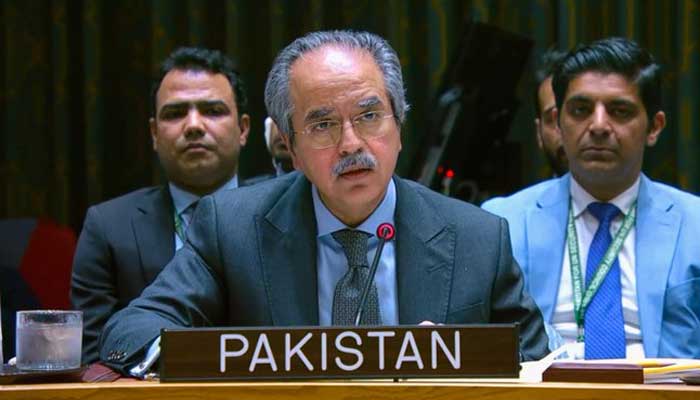Pakistan’s Permanent Representative to the United Nations, Ambassador Asim Iftikhar, strongly criticized Israel’s recent strike on Qatar during an emergency meeting of the United Nations Security Council (UNSC). Speaking at the session convened to discuss the Middle East situation, Iftikhar condemned the attack as a flagrant violation of international law and the UN Charter, while also warning of its dangerous implications for peace and security.
Violation of Sovereignty and International Law
Addressing the UNSC, Ambassador Iftikhar declared that the strike represented not just an attack on Qatar but also a blow to the collective principles that underpin the international system.
“This reckless and provocative attack constitutes a flagrant violation of the sovereignty and territorial integrity of Qatar, contrary to the fundamental principles of international law, including the UN Charter,” he emphasized.
By directly targeting the territory of a sovereign nation, Israel, according to Iftikhar, had undermined global stability and dealt a severe setback to ongoing peace efforts in the region.
Impact on Gaza Peace Negotiations
The Pakistani envoy noted that the assault came at a particularly sensitive moment, when negotiations on a Gaza peace deal were reportedly making progress. He described the strike as a deliberate attempt to sabotage diplomacy, stressing that Israel’s actions aimed to derail mediation efforts and prolong the suffering of civilians caught in the conflict.
“At a time when delicate negotiations on the Gaza peace deal were progressing towards a possible breakthrough, striking the territory of a principal mediator and those directly involved in negotiations is a deliberate attempt to sabotage diplomacy,” Iftikhar remarked.
UNSC’s Response and Global Reaction
The UNSC issued a condemnation of the strikes on Doha, though its statement refrained from explicitly naming Israel. Despite this omission, the resolution was adopted unanimously, with all 15 members—including the United States—backing it.
This collective response underscored the Council’s recognition of the seriousness of the situation, yet the lack of direct attribution drew criticism from several quarters, who argued that failure to name Israel weakened the message of accountability.
Pakistan’s Support for Qatar and the Two-State Solution
Reiterating Islamabad’s position, Ambassador Iftikhar reaffirmed Pakistan’s solidarity with Qatar and its role as a mediator in the Middle East conflict. He further underlined Pakistan’s unwavering support for a two-state solution, calling it the only viable path to achieving lasting peace.
“This brazen and illegal assault is not an isolated incident, rather it is part of a broader and consistent pattern of aggression and violation of international law by Israel. Pakistan stands shoulder to shoulder with Qatar,” he said.
He also cautioned that the UN Security Council must not allow violations of international law to go unchecked, warning that continued inaction emboldens aggressors.
Concerns Over Israel’s Broader Policies
Iftikhar’s address carried a broader warning, asserting that Israel’s aggressive approach to regional disputes was incompatible with international efforts for peace. He lamented that the lack of firm measures by the international community had enabled Israel to continue on a destructive path.
“It is evident that Israel, the occupying power, is bent on undermining every possibility of peace. Clearly, Israel’s destructive policies are incompatible with the international community’s quest for stability,” he declared.
Raising the Indus Waters Treaty Issue
In addition to Middle East developments, the Pakistani envoy highlighted another critical concern: the Indus Waters Treaty (IWT). He cautioned against the use of water as a weapon, describing the treaty—signed more than six decades ago—as Pakistan’s lifeline.
“The IWT cannot be suspended unilaterally by any party,” Iftikhar stated, pointing out that India’s suspension of regular water-flow data sharing had raised fears of potential misuse, either through blocking water or releasing excess volumes to cause flooding.
With Pakistan experiencing devastating floods in recent years, Iftikhar underscored that cooperation in water management is not optional but a necessity for regional peace and stability.
